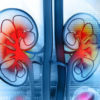What Is Rectal Cancer?
 When cells in the rectum mutate and grow out of control, the result is rectal cancer. Another scenario in which a patient develops rectal cancer is when growths, called polyps, on the inner wall of the rectum form and become cancerous.
When cells in the rectum mutate and grow out of control, the result is rectal cancer. Another scenario in which a patient develops rectal cancer is when growths, called polyps, on the inner wall of the rectum form and become cancerous.
Approximately 5% of people will develop rectal cancer at some point in their lives, and of those, about 11% will be under the age of 50. Furthermore, about one-third of the 153,000 cases of colorectal cancer diagnosed each year are found in the rectum.
Rectal cancer is often broken down into five different stages. The stages are based on the size of the rectal tumor found in the patient and whether it has spread.
- Stage 0: The rectal lining shows evidence of cancer cells
- Stage 1: A tumor has begun to form below the rectal lining and possibly into the rectal wall
- Stage 2: The tumor has now grown into the rectal wall with the possibility of extending into the tissues around the rectum
- Stage 3: The lymph nodes next to the rectum have been invaded by the tumor, along with some of the tissues outside of the rectal wall
- Stage 4: The tumor has spread to distant lymph nodes or organs
Patients with early stages of rectal cancer may not experience any symptoms, making the need for frequent screenings vital.
What Are the Symptoms of Rectal Cancer?
While clear warning signs of rectal cancer in its early stages may be difficult to detect, symptoms tend to progress as the disease develops. Rectal cancer symptoms may include:
- Rectal bleeding
- Blood found in a patient’s stool
- Narrow stool
- Diarrhea
- Constipation
- A sudden change in bowel habits
- Weakness or fatigue
- Abdominal pain
- Unexplained weight loss
- A feeling that the bowel does not empty completely
What Are the Risk Factors for Rectal Cancer?
Unfortunately, the exact cause of rectal cancer is still unknown. However, several factors are known for increasing the risk of rectal cancer. Risk factors for rectal cancer include:
- Age: The risk of rectal cancer increases as people age, with the average age of diagnosis being 63 for both men and women.
- Gender: It is known that men are slightly more likely to develop rectal cancer than women.
- Ethnicity: Rectal cancer is known to be more common among Black people than among other ethnicities, for reasons that are not yet fully understood.
- Family history: Patients with a family member who has been diagnosed with rectal cancer are at a much higher risk of developing the disease themselves.
- Certain existing health conditions: Several medical conditions can increase the risk of developing rectal cancer, such as inflammatory bowel diseases such as Crohn’s disease and ulcerative colitis.
- Smoking: Those who smoke are more likely to develop rectal cancer.
- Obesity: People who are overweight or obese are more likely to suffer from rectal cancer than people who remain at a healthy weight.
- Consuming processed meat: The consumption of red meat and processed meat in large amounts puts individuals at an increased risk of developing rectal cancer.
How Is Rectal Cancer Diagnosed?
To accurately diagnose rectal cancer, healthcare practitioners will recommend various tests to confirm. These exams may include:
- Laboratory tests, such as blood tests
- Biopsy
- Colonoscopy
- Imaging tests such as MRI, CT scan, and ultrasound
How Is Rectal Cancer Prevented?
Regular screening is the key to preventing colorectal cancer and finding it early, according to the American Cancer Society. Screenings are crucial because early detection dramatically increases the survival rate for patients with rectal cancer.
There are several test options for colorectal cancer screening:
Stool-Based Tests
- Highly sensitive fecal immunochemical test (FIT) – every year
- Highly sensitive guaiac-based fecal occult blood test (gFOBT) – every year
- Multi-targeted stool DNA test (mt-sDNA) – every 3 years
Structural Exams
- Colonoscopy – every 10 years
- CT colonography (virtual colonoscopy) – every 5 years
- Flexible sigmoidoscopy (FSIG) – every 5 years
Patients should speak with their healthcare provider to determine which tests are ideal for them given their symptoms and medical history.
Can Rectal Cancer Be Treated?
The best course of action for treating rectal cancer depends on several factors, such as the location, size, and progression of the tumor, as well as the patient’s overall health and personal preferences. Oncologists may provide the following treatments for rectal cancer:
- Surgery
- Immunotherapy
- Chemotherapy
- Radiation therapy
- Targeted therapy
Trust the Gastroenterology Team at Bergen Medical Associates
Bergen Medical Associates is proud to offer patients a complete range of diagnostic services to properly care for gastrointestinal diseases and disorders. Located in northern New Jersey and serving patients throughout the region, the team of board-certified gastroenterologists possesses the knowledge and expertise to provide expert care and services. Contact Bergen Medical Associates to learn more about rectal cancer and gastroenterology care.











